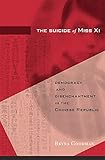The Suicide of Miss Xi : Democracy and Disenchantment in the Chinese Republic / Bryna Goodman.
Material type: TextPublisher: Cambridge, MA : Harvard University Press, [2021]Copyright date: ©2021Description: 1 online resource (288 p.)Content type:
TextPublisher: Cambridge, MA : Harvard University Press, [2021]Copyright date: ©2021Description: 1 online resource (288 p.)Content type: - 9780674248823
- 9780674259140
- Civil rights -- China -- Shanghai -- History
- Democracy -- China -- Shanghai -- History
- Sexism -- China -- Shanghai -- History
- Stock exchanges -- China -- Shanghai -- History
- HISTORY / Asia / China
- 20th century China
- Chinese democracy
- May Fourth Movement
- Modern China
- New Culture Movement
- Republican China
- Shanghai history
- Shanghai
- finance
- financial bubble
- gender
- legal history
- legal reform
- newspaper history
- print culture
- scandal
- stock market
- 951/.132041 23
- DS776.6 .G66 2021
- online - DeGruyter
| Item type | Current library | Call number | URL | Status | Notes | Barcode | |
|---|---|---|---|---|---|---|---|
 eBook
eBook
|
Biblioteca "Angelicum" Pont. Univ. S.Tommaso d'Aquino Nuvola online | online - DeGruyter (Browse shelf(Opens below)) | Online access | Not for loan (Accesso limitato) | Accesso per gli utenti autorizzati / Access for authorized users | (dgr)9780674259140 |
Frontmatter -- Contents -- Prologue: A Scandal in the City -- 1 Shanghai Democracy and the Empty Republic -- 2 The New Woman, the Ghost, and the Ubiquitous Concubine -- 3 Long Live the Republic, Long Live the Stock Exchange -- 4 Morality and Justice in an Unsettled Republic -- 5 A Public without a Republic? -- Abbreviations -- Notes -- Glossary -- Selected Bibliography -- Acknowledgments -- Index
restricted access online access with authorization star
http://purl.org/coar/access_right/c_16ec
A suicide scandal in Shanghai reveals the social fault lines of democratic visions in China’s troubled Republic in the early 1920s. On September 8, 1922, the body of Xi Shangzhen was found hanging in the Shanghai newspaper office where she worked. Although her death took place outside of Chinese jurisdiction, her US–educated employer, the social activist Tang Jiezhi, was kidnapped by Chinese authorities and put on trial. As scandal rocked the city, novelists, filmmakers, suffragists, reformers, and even a founding member of the Chinese Communist Party seized upon the case as emblematic of deeper social problems. Xi’s family claimed that Tang had pressured her to be his concubine; his conviction instead for financial fraud only stirred further controversy. The creation of a republic ten years earlier had unleashed a powerful vision of popular sovereignty and a view of citizenship founded upon science, equality, and family reform. But, Bryna Goodman shows, after the suppression of the first Chinese parliament, efforts at urban liberal democracy dissolved in a flash of speculative finance and the suicide of an educated, working “new woman.” In yet another blow, Tang’s trial exposed the frailty of legal mechanisms in a political landscape fragmented by warlords and enclaves of foreign colonial rule. The Suicide of Miss Xi opens a window onto how urban Chinese in the first part of the twentieth century navigated China’s early passage through democratic populism, in an ill-fated moment of possibility between empire and party dictatorship. Xi Shangzhen became a symbol of the failures of the Chinese Republic as well as the broken promises of citizen’s rights, gender equality, and financial prosperity betokened by liberal democracy and capitalism.
Mode of access: Internet via World Wide Web.
In English.
Description based on online resource; title from PDF title page (publisher's Web site, viewed 01. Dez 2022)


